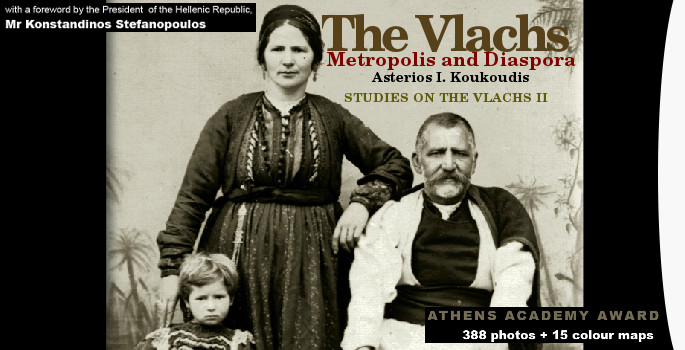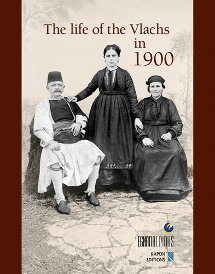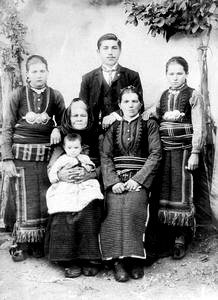When I first took up the study of the Vlachs, my investigations were much more in the nature of a personal quest. I was looking for my own roots with the kind of curiosity anyone might feel about his or her ancestry. I eventually came to be more interested in the distant origins of the Vlachs themselves, having realised that, whatever those origins might be, they do not necessarily invest the Vlachs with a collective identity.
From this point onwards, the challenge for me was to paint a portrait of the Vlachs that rose above the political prejudices old and new which prevent others from seeing them as they really are. What I wanted to do was to demolish the stereotypical view of them as either a small, insignificant, marginal group of traditional pastoral nomads or a still unliberated ethnic minority in need of protection.
It seemed to me that the best way of answering the fundamental question of "Who are the Vlachs?" was to make a historical record of all their villages and settlements and to portray their many and various intracommunal groups and distinctions, together with an account of their dispersal throughout the Balkans after the watershed year of 1769. My aim was to show the diverse identity which they themselves evolved (under the influence, of course, of their environment) from the first mediaeval references until the early twentieth century, when political interference in the general view of the Vlachs, nationalism, and the concomitant propaganda became serious factors in the games that were being played over the fate of the Ottoman provinces in the Balkans.
This English edition of The Vlachs: Metropolis and Diaspora, the second volume of my Studies on the Vlachs, was quite unhoped-for. I hope it will help scholars and ordinary readers alike to appreciate many of the distinctive features which characterise the Vlachs, and to see them not merely as a subject of historical ethnography, but as a living reality. In these modern times, when all sorts of minorities are again being tormented, and tormenting the Balkans in their turn, it is vital to understand that the Vlachs, especially those in Greece, do not constitute a stereotypical minority. This does not mean, of course, that we should regard them with indifference. However, all those who take any kind of interest in them, whether scientific or political, ethnic or international, must take serious account both of their historical identity and, above all, of the fact that the Vlachs of Greece, who make up the majority of the Vlachs in the Balkans and who are still living in their ancestral homeland, do not cherish, and certainly do not express, collective political tendencies or demands. On the contrary, they regard any attempt to treat them as a minority with great scepticism and unease.
With regard to this English edition, I should like to thank Professor Yannis Drossos, Director of the Institute for Defence Analysis, for recognising its importance and supporting its publication; my publisher Mr Kostas Zitros for his unreserved support and interest; and the translator Ms Deborah Whitehouse for all her arduous efforts.
The rendering of Vlach place-names, terms, phrases, and words posed a problem, because in the original edition I had them all in Greek characters, making every effort to produce as close a phonetic rendering as possible. For the English edition, being fully aware of my own linguistic limitations, I enlisted the help of a much better qualified person, namely Dr Kostas Dinas, Professor of Linguistics. In the following note, he sets out the scientific reasoning on which he based his rendering of the Vlach words and indicates how they should be read. As far as the Vlach personal names are concerned, however, they are phonetically transliterated directly from their Greek forms as found in the original, Greek, edition, simply because, I confess, I do not know the correct Vlach forms.
Asterios Koukoudis
Thessaloniki, June 2001.







